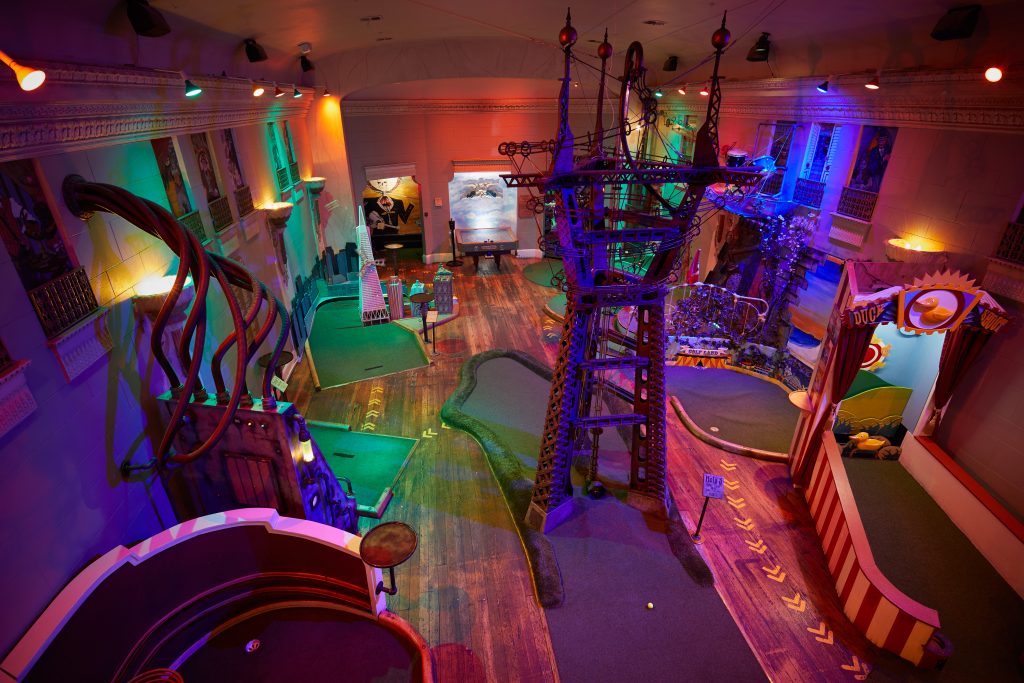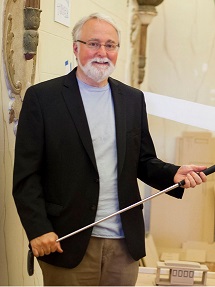In 2014, after taking Renaissance Entrepreneurship Center’s Business Planning Class taught by Paul Terry and a team of teachers, Steve Fox opened Urban Putt, an indoor miniature golf course and restaurant in San Francisco’s Mission district.
We celebrated Steve’s business many years back in this blog post featuring Renaissance graduates who launched small businesses in 2014. Now, 8 years later, we are returning to those small business owners to ask them about their businesses, how they’ve been managing through the pandemic and what insights they’d like to share about small business ownership.
An interview with Steve Fox of Urban Putt
What inspired you to start your business? At age 55, I had grown disenchanted with publishing (my career of 35 years, at the time), which seemed to be in steep decline. I realized I needed a change, maybe even a clean start, or I would end up bitter and depressed. For many years, my wife and I had hosted “bring-your-own-hole” mini-golf parties at our San Francisco house, and we saw how much people enjoyed them. I began daydreaming about the possibility of starting a mini-golf course in the city. With no clue how to even begin, I enrolled in your business startup class at Renaissance Entrepreneur Center, where I crystallized the idea and ultimately wrote a business plan. Keep in mind, I had no illusions about being an entrepreneur or a small business owner. I just knew I loved mini-golf and I drew joy from giving parties as happy, engaged people milled about. That was the germ of the idea.
Since you started your business, have your thoughts about small business ownership changed? In retrospect, I was incredibly naïve about what such a venture would require. I had expertise in management and hiring but lacked virtually any other relevant skills. Over the last eight years of running Urban Putt, I’ve had to develop expertise in raising money (a very big deal, as it turns out), financial management, food service, and the endless minutiae of being the boss of your own business. On any given day, one might have to deal with insurance, corporate taxes, arbitrary city regulations, plumbing leaks, business licenses, marketing and advertising, responding to bad reviews on Yelp, neighborhood power outages, questionable employee behavior, drunks, tech issues, menu changes, point-of-sale system SNAFUs, payroll issues, credit card fraud, 3 AM calls from the Fire Department (blessedly always a false alarm so far), broken minigolf holes, P&Ls and balance sheets, and more. There are many sleepless nights.
Given all that business ownership entails, is it worth it? Even given all of that, I would still recommend owning a small business for anyone with the stomach for it. The rewards of self-determination are manifest. Sadly, the job is often more reactive as opposed to proactive, even if you try to plan everything out. My best advice for others would be to start small, and grow into it.
What happened to your business when the pandemic hit? The pandemic was punishing, and nearly closed the business for good. In San Francisco, we were forced to close for more than a year (starting in March 2020). We had also opened Urban Putt Denver in September 2019, and that was closed for about six months before reopening. We had to lay off employees and tighten our belts. If we had not gotten PPP loans for both businesses, we wouldn’t have made it back.
How have you managed re-opening? What operational changes have you implemented? Once we reopened, business was greatly reduced, with occupancy restrictions, nervous customers, and the collapse of corporate parties, a big source of our revenue.
Faced with lower sales, we reopened with a reduced staff. Then as business started coming back, we learned that we could get by with smaller payroll. In truth, we wanted to hire more folks, but we literally could not find qualified people to work. This enforced discipline ended up making us reevaluate our staffing needs.
We also changed many elements of our service model. For instance, instead of providing table service, customers place orders at the bar and then food runners bring their orders out to them. We also experimented with different reservation models. For the first year or so, reservations simply guaranteed entry into the building, since we were primarily concerned with crowding and exposure during COVID. We have more recently returned to accepting dinner reservations and are re-instituting limited table service. The key is to test, learn, and implement based on metrics.
Similarly, we have pared down our menu to make it easier to get food out the door with a reduced kitchen staff. And we are making a greater effort to use many of the same ingredients in multiple dishes, again for cost and time savings. Because of our tighter margins, we are examining and revising menus much more frequently, and looking closely at costs. At the philosophical level, we want to make sure the ingredients are of high quality, since that is critical to our brand; we would rather remove an item than go with cheaper ingredients that would compromise the product.
We have also started looking more closely at different metrics to keep track of how we are doing. I’ve been paying attention to Gross Profit after Prime Costs (GPPC), which is a percentage that shows how we are doing with costs we can control. Of course, I also look at Net Operating Income (NOI) and costs of goods. The main lesson I took away from COVID is that you need to examine all your procedures regularly. Just because you’ve always done something one way doesn’t make it right.
On a personal level, how have you been managing through these challenging times? I would love to be more Zen, but it is simply not in my nature. To deal with the stress over the last several years, I have started walking to work every day, about 90 minutes roundtrip, while listening to audio books. It’s a great way to stay collected and take your mind off the day-to-day. This also has the added benefit of allowing me to catch up on great works of fiction that I should have read back in college. How could a former English major never have read Moby Dick?
Any specific products or services to promote? I want customers to eat, drink, play mini-golf and encounter the joy that is Urban Putt San Francisco. I would certainly also like for more local companies to throw their parties at Urban Putt. Daytime team-building events and evening buyouts, when partygoers have the place entirely to themselves, are a fabulous way to bring the staff together. Inquiries start at https://www.urbanputt.com/events-san-francisco/


Leave a Reply